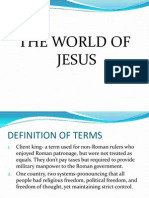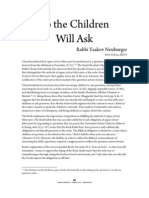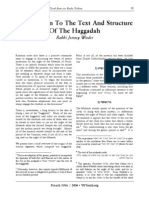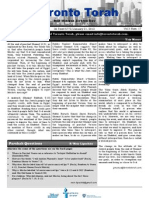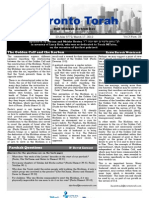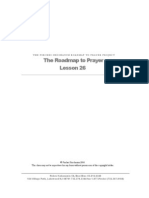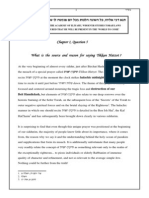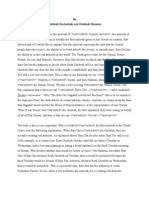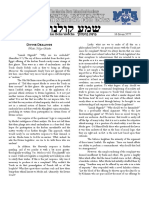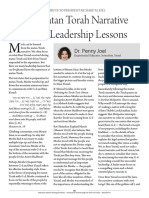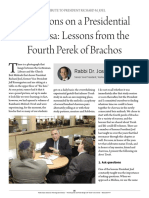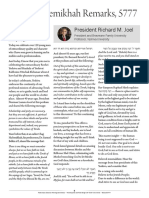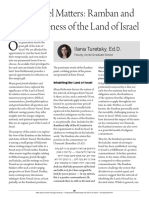The Mitzvah of Sipur Yetziat Mitzraim
The Mitzvah of Sipur Yetziat Mitzraim
Uploaded by
outdash2Copyright:
Available Formats
The Mitzvah of Sipur Yetziat Mitzraim
The Mitzvah of Sipur Yetziat Mitzraim
Uploaded by
outdash2Original Title
Copyright
Available Formats
Share this document
Did you find this document useful?
Is this content inappropriate?
Copyright:
Available Formats
The Mitzvah of Sipur Yetziat Mitzraim
The Mitzvah of Sipur Yetziat Mitzraim
Uploaded by
outdash2Copyright:
Available Formats
The Mitzvah of Sipur Yetziat Mitzraim
There are many mitzvot, practices, and traditions that relate to the first night of
Pesach. The most central is the mitzvah of sipur yetziat Mitzraim, the recounting of the
story of the exodus from Egypt. Acharonim ask a fundamental question regarding the
mitzvah of sipur yetziat Mitzraim. The Mishna, Berachot 12b, as well as the Haggadah,
record a dispute between Ben Zoma and Chachamim as to whether there is an obligation
to mention the exodus from Egypt on a nightly basis (zechirat yetziat Mitzraim).
Rambam, Hichot Keri'at Sh'ma 1:3, rules in accordance with Ben Zoma that there is a
mitzvah to mention the exodus on a nightly basis. If in fact, there is such a mitzvah, what
is added by having an additional mitzvah on the first night of Pesach of sipur yetziat
Mitzraim. Isn’t this already a nightly obligation?
The Difference between Sipur and Zechirah
R. Chaim Soloveitchik, Chidushei HaGrach al HaShas, Pesachim 116a, answers
that the mitzvah that exists throughout the year is a mitzvah of zechirah, mentioning the
exodus from Egypt. The mitzvah on the first night of Pesach is a mitzvah of sipur,
recounting the exodus from Egypt. R. Chaim states that this difference is manifest in
three ways. First, the Beraita (quoted in Pesachim 116a) states that part of the
requirement of sipur yetziat Mitzraim is that it must be in question and answer format.
The extent of this requirement is such that even if a person is alone, he must ask
questions of himself. R. Chaim notes that this requirement only applies to the mitzvah of
sipur yetziat Mitzraim. It does not apply to the nightly mitzvah of zechirat yetziat
Mitzraim. Second, the Mishna, Pesachim 116a, states that the story of the Exodus must
start by mentioning the dishonorable events and end with the praiseworthy events. R.
Chaim notes that this requirement is limited to the mitzvah of sipur yetziat Mitzraim, and
not the mitzvah of zechirat yetziat Mitzraim. Third, the Mishna, Pesachim 116a, states in
the name of Rabban Gamliel that in order to fulfill the mitzvah of sipur yetziat Mitzraim,
one must mention the korban pesach, the matzah and the maror, and how they relate to
the story of the exodus from Egypt. There is no such requirement when fulfilling the
nightly obligation to mention the exodus from Egypt.
R. Chaim's grandson, R. Yosef Dov Soloveitchik (quoted in Hagadat Si'ach
HaGrid no. 27), adds one more fundamental difference between the mitzvah of sipur
yetziat Mitzraim and the mitzvah of zechirat yetziat Mitzraim. The mitzvah of sipur
yetziat Mitzraim not only requires one to recount the story of the exodus from Egypt, but
requires that one also praise the Almighty for all of the miracles that were performed at
the time. This is why Hallel is recited on the first night of Pesach. As such, Hallel is part
of the mitzvah of sipur yetziat Mitzraim.
The Tosefta, Pesachim 10:8, states that there is a requirement to learn the laws of
Pesach the entire first night of Pesach. [Shulchan Aruch, Orach Chaim 481:2, codifies
this Tosefta and writes that one is not required to stay up the entire night, but should at
least learn the laws of Pesach until sleep overcomes him.] R. Soloveitchik, ibid, no. 22,
comments that the requirement to spend the night learning the laws of Pesach is part of
the mitzvah of sipur yetziat Mitzraim. One can then add another distinction between the
mitzvah of sipur yetziat Mitzraim and the mitzvah of zechirat yetziat Mitzraim. As
opposed to the mitzvah of zechirat yetziat Mitzraim, the mitzvah of sipur yetziat Mitzraim
requires that one familiarize oneself with the laws that relate to the mitzvot of the first
night of Pesach.
A unique aspect of the seder is that one is required see oneself (lirot et atzmo) as
if he was personally liberated from Egypt (Mishna, Pesachim 116b). Rambam, Hilchot
Chametz UMatzah 7:6, writes that one must exhibit oneself (l'harot et atzmo) as if he was
liberated from Egypt. Rambam then writes (ibid, 7:7) that this is the reason why one eats
in a reclined position (heseibah), and why one drinks four cups of wine on the first night
of Pesach. One can argue that the requirement to exhibit oneself as if he was liberated is
an independent fulfillment of the mitzvah of pirsumei nissa, publicizing the miracles.
However, one can equally argue that publicizing the miracles of the night is an added
fulfillment of the mitzvah of sipur yetziat Mitzraim. Whereas the mitzvah of zechirat
yetziat Mitzraim only requires that one mention the exodus from Egypt, the mitzvah of
sipur yetziat Mitzraim demands that one re-experience the exodus.
The Role of Children
An integral element of the mitzvah of sipur yetziat Mitzraim is the role of
children. Rambam, ibid, 7:3, writes that one is required to make certain changes to the
meal in order to elicit questions from the children. Rambam, ibid, 7:2, adds that even if
the children do not ask any questions, there is a mitzvah to teach one's child about the
events surrounding the exodus from Egypt.
The Gemara, Pesachim 109a, quotes R. Eliezer that one should grab the matzahs
in order that the children don't sleep. Rashi, ad loc., s.v. Chotfin, and Ra'avad, Hilchot
Chametz UMatzah 7:3, interpret this to mean that the matzah should be eaten without
delay in order that children should remain awake. Rambam, ibid, 7:3, states that R.
Eliezer refers to the practice of stealing the afikoman in order that the children stay awake
until the end of the meal.
There is another aspect of the mitzvah of sipur yetziat Mitzraim that seems to be
at odds with Rashi's interpretation that the matzah should be eaten without delay. The
Haggadah states that with regards to the mitzvah of recounting the exodus form Egypt
that the more one adds in recounting the exodus from Egypt, the more praiseworthy he is.
The Haggadah supports this point by relating a story of five great sages who stayed up
the entire night discussing the exodus from Egypt. Many commentaries (Meyuchas
LaRashbam ad loc., Orchot Chaim ad loc., and Kol Bo ad loc.) ask, how can it be
praiseworthy to spend more time recounting the exodus from Egypt; shouldn't the matzah
be eaten without delay? They answer that the concept of spending additional time
relating the story of the exodus from Egypt does not apply until after the matzah is eaten.
The five great sages who spent the entire night discussing the exodus from Egypt only
did so after they finished the seder.
Mishna Berurah, Sha'ar HaTzi'un 472:2, implies that there is a different answer
implicit in the comments of R. Shimon Ben Tzemach (Rashbetz), Ma'amar HaChametz
s.v. Tanya. Rashbetz writes that the children should be fed expeditiously. Mishna
Berurah interprets this to mean that one does not have to perform the seder quickly, but
rather one should make sure that the children eat earlier than the rest of the participants.
The practical difference between the two interpretations is whether one should
perform the seder quickly, and expound upon the exodus from Egypt after the seder, or
whether one should expound upon the exodus from Egypt during the actual seder while
providing the children with an abridged form of the seder. Mishna Berurah leans slightly
towards the latter approach.
Both interpretations offer varied solutions as to how ensure that the children are
active participants in the seder. They both agree that the participation of the children is
of primary importance. Regardless of which approach one follows, one should ensure
that the conversations and discussions surrounding the seder are age-appropriate to the
participating children.
The Weekly Halacha Overview, by Rabbi Josh Flug, is a
service of YUTorah, the online source of the Torah of
Yeshiva University. Get more halacha shiurim and
thousands of other shiurim, by visiting
www.yutorah.org.
You might also like
- Lessons Learned From Conversion: Rabbi Zvi RommNo ratings yetLessons Learned From Conversion: Rabbi Zvi Romm5 pages
- So The Children Will Ask: Rabbi Yaakov NeuburgerNo ratings yetSo The Children Will Ask: Rabbi Yaakov Neuburger6 pages
- Is The Seder Table A "Round-Table" or A Lectern?: I Think, I Can?No ratings yetIs The Seder Table A "Round-Table" or A Lectern?: I Think, I Can?11 pages
- The Greatness of The Brit Milah: BereishitNo ratings yetThe Greatness of The Brit Milah: Bereishit5 pages
- Introduction To The Text and Structure of The Haggadah: Rabbi Jeremy WiederNo ratings yetIntroduction To The Text and Structure of The Haggadah: Rabbi Jeremy Wieder4 pages
- Sippur Yetzias Mitzrayim As A Special Form of Talmud TorahNo ratings yetSippur Yetzias Mitzrayim As A Special Form of Talmud Torah10 pages
- Am Mefuzar or Ish Echad?: Rabbi Dovid AsherNo ratings yetAm Mefuzar or Ish Echad?: Rabbi Dovid Asher3 pages
- Maintaining Peace of Mind in A High-Speed World: Rabbi Moshe Tzvi WeinbergNo ratings yetMaintaining Peace of Mind in A High-Speed World: Rabbi Moshe Tzvi Weinberg11 pages
- Pesach Sheni & Rabbinic Burn Out: Rabbi Maury GrebenauNo ratings yetPesach Sheni & Rabbinic Burn Out: Rabbi Maury Grebenau2 pages
- The Nine Aspects of The Haggada: Harav Joseph B. SoloveitchikNo ratings yetThe Nine Aspects of The Haggada: Harav Joseph B. Soloveitchik5 pages
- The Message of Maggid: Rabbi Assaf BednarshNo ratings yetThe Message of Maggid: Rabbi Assaf Bednarsh2 pages
- Don't Outsmart The Torah: by Eitan Lipsky, 12th GradeNo ratings yetDon't Outsmart The Torah: by Eitan Lipsky, 12th Grade6 pages
- Semicha: Then and Now: Rabbi Hershel SchachterNo ratings yetSemicha: Then and Now: Rabbi Hershel Schachter4 pages
- The Mitzvah of Achilat Matzah: The Need For Three MatzahsNo ratings yetThe Mitzvah of Achilat Matzah: The Need For Three Matzahs3 pages
- Tazria Selections From Rabbi Baruch EpsteinNo ratings yetTazria Selections From Rabbi Baruch Epstein3 pages
- Aryeh Lebowitz I. Introduction. When One Thinks of The Holiday of Purim We Immediately Think of TheNo ratings yetAryeh Lebowitz I. Introduction. When One Thinks of The Holiday of Purim We Immediately Think of The3 pages
- Likutei Ohr: A Publication of YULA Boys High SchoolNo ratings yetLikutei Ohr: A Publication of YULA Boys High School2 pages
- The Significance of Teshuva During Aseres Yemei TeshuvaNo ratings yetThe Significance of Teshuva During Aseres Yemei Teshuva8 pages
- Rav Baruch Rosenblum - Hoshana Rabbah 5780 - 5783No ratings yetRav Baruch Rosenblum - Hoshana Rabbah 5780 - 57836 pages
- Bo Kiddush Hachodesh and Kiddush Hazman: Yisroel V'hazmanim." Why? The Bais Din Hagadol Served Two FunctionsNo ratings yetBo Kiddush Hachodesh and Kiddush Hazman: Yisroel V'hazmanim." Why? The Bais Din Hagadol Served Two Functions5 pages
- In This Issue: Hada'at Finished With The Ultimate Moral Code, The TorahNo ratings yetIn This Issue: Hada'at Finished With The Ultimate Moral Code, The Torah12 pages
- "Altar"ation of Our Homes: Chametz and TheNo ratings yet"Altar"ation of Our Homes: Chametz and The8 pages
- Mishpatim - Selections From Rabbi Baruch EpsteinNo ratings yetMishpatim - Selections From Rabbi Baruch Epstein3 pages
- KASHER, R. - THE ARAMAIC TARGUMIM AND THEIR 'SITZ IM LEBEN' - PWCJS (1985) 75-85No ratings yetKASHER, R. - THE ARAMAIC TARGUMIM AND THEIR 'SITZ IM LEBEN' - PWCJS (1985) 75-8512 pages
- Parshatbo Ti Me For Freedom Ra Bbi Ari KahnNo ratings yetParshatbo Ti Me For Freedom Ra Bbi Ari Kahn6 pages
- Signs of the Cross: the Search for the Historical Jesus: From a Jewish PerspectiveFrom EverandSigns of the Cross: the Search for the Historical Jesus: From a Jewish Perspective5/5 (1)
- In Search of the New Covenant & The Seed of the Serpent: Face Facts, Forget Fiction, #2From EverandIn Search of the New Covenant & The Seed of the Serpent: Face Facts, Forget Fiction, #2No ratings yet
- The Meaning of The Menorah: Complete Tanach)No ratings yetThe Meaning of The Menorah: Complete Tanach)4 pages
- The Matan Torah Narrative and Its Leadership Lessons: Dr. Penny JoelNo ratings yetThe Matan Torah Narrative and Its Leadership Lessons: Dr. Penny Joel2 pages
- I Just Want To Drink My Tea: Mrs. Leah NagarpowersNo ratings yetI Just Want To Drink My Tea: Mrs. Leah Nagarpowers2 pages
- The Surrogate Challenge: Rabbi Eli BelizonNo ratings yetThe Surrogate Challenge: Rabbi Eli Belizon3 pages
- Consent and Coercion at Sinai: Rabbi Dr. Jacob J. SchacterNo ratings yetConsent and Coercion at Sinai: Rabbi Dr. Jacob J. Schacter3 pages
- Shavuot To-Go - 5777 Mrs Schechter - Qq4422a83lNo ratings yetShavuot To-Go - 5777 Mrs Schechter - Qq4422a83l2 pages
- Reflections On A Presidential Chavrusa: Lessons From The Fourth Perek of BrachosNo ratings yetReflections On A Presidential Chavrusa: Lessons From The Fourth Perek of Brachos3 pages
- Flowers and Trees in Shul On Shavuot: Rabbi Ezra SchwartzNo ratings yetFlowers and Trees in Shul On Shavuot: Rabbi Ezra Schwartz2 pages
- Performance of Mitzvos by Conversion Candidates: Rabbi Michoel ZylbermanNo ratings yetPerformance of Mitzvos by Conversion Candidates: Rabbi Michoel Zylberman6 pages
- What Happens in Heaven... Stays in Heaven: Rabbi Dr. Avery JoelNo ratings yetWhat Happens in Heaven... Stays in Heaven: Rabbi Dr. Avery Joel3 pages
- Kabbalat Hatorah:A Tribute To President Richard & Dr. Esther JoelNo ratings yetKabbalat Hatorah:A Tribute To President Richard & Dr. Esther Joel2 pages
- Lessons From Mount Sinai:: The Interplay Between Halacha and Humanity in The Gerus ProcessNo ratings yetLessons From Mount Sinai:: The Interplay Between Halacha and Humanity in The Gerus Process3 pages
- Experiencing The Silence of Sinai: Rabbi Menachem PennerNo ratings yetExperiencing The Silence of Sinai: Rabbi Menachem Penner3 pages
- José Faur: Modern Judaism, Vol. 12, No. 1. (Feb., 1992), Pp. 23-37No ratings yetJosé Faur: Modern Judaism, Vol. 12, No. 1. (Feb., 1992), Pp. 23-3716 pages
- Chag Hasemikhah Remarks, 5777: President Richard M. JoelNo ratings yetChag Hasemikhah Remarks, 5777: President Richard M. Joel2 pages
- Why Israel Matters: Ramban and The Uniqueness of The Land of IsraelNo ratings yetWhy Israel Matters: Ramban and The Uniqueness of The Land of Israel5 pages
- Torah Table Talk - A New Pardes: Second Passover: A Lesson in HospitalityNo ratings yetTorah Table Talk - A New Pardes: Second Passover: A Lesson in Hospitality3 pages
- Walk Through The Scripture - Passion Week Chronology r.4.2.7No ratings yetWalk Through The Scripture - Passion Week Chronology r.4.2.7189 pages
- Passover Guide: Harry & Alice Adjmi & FamilyNo ratings yetPassover Guide: Harry & Alice Adjmi & Family68 pages
- From Bondage To Redemption - Moore (Reformatted) PDFNo ratings yetFrom Bondage To Redemption - Moore (Reformatted) PDF21 pages
- What You Should Know: Festival of Unleavened BreadNo ratings yetWhat You Should Know: Festival of Unleavened Bread8 pages




